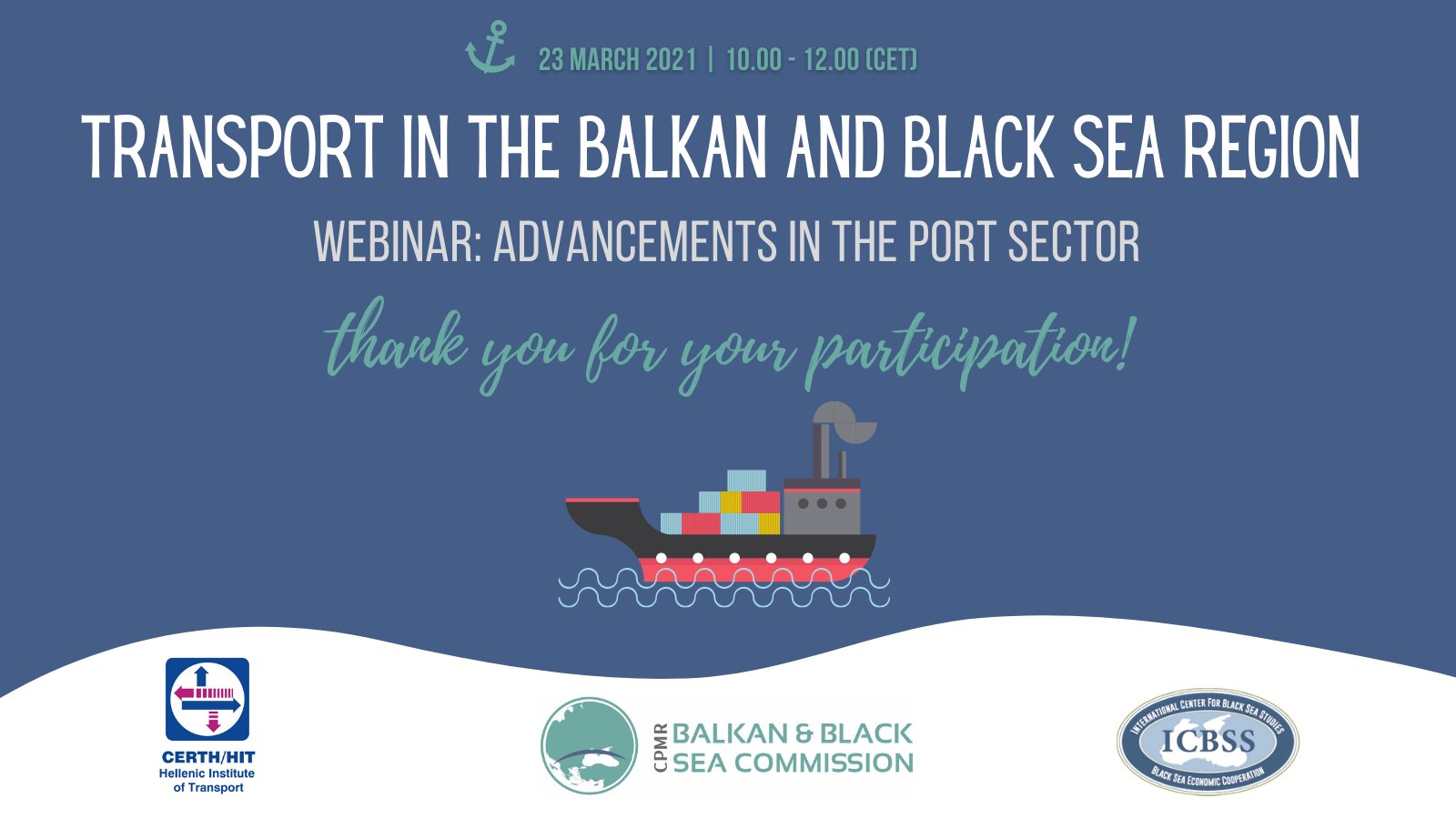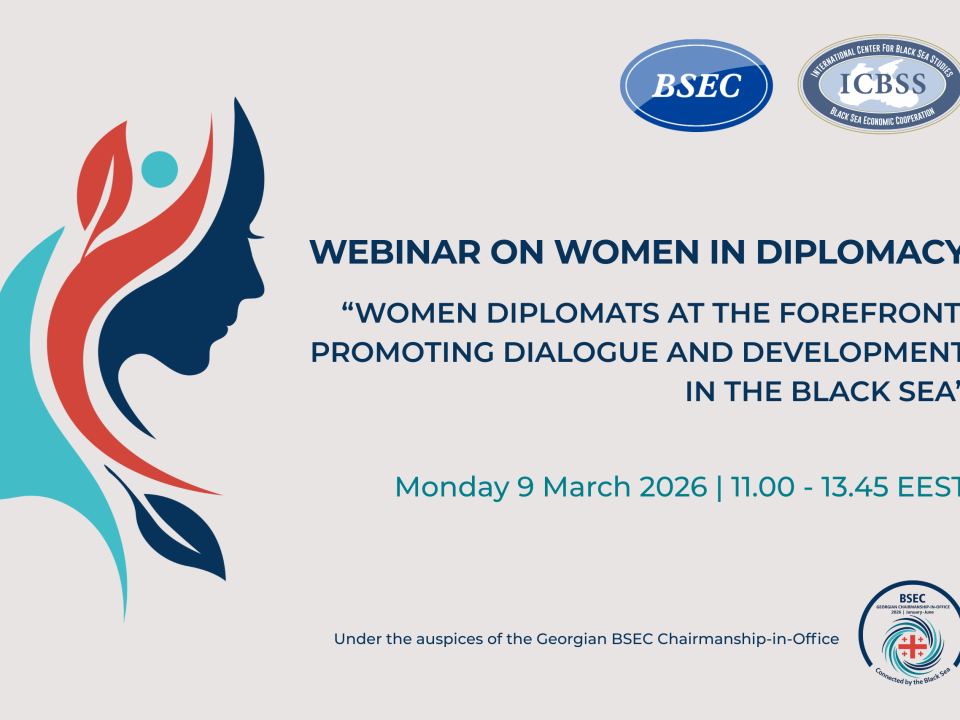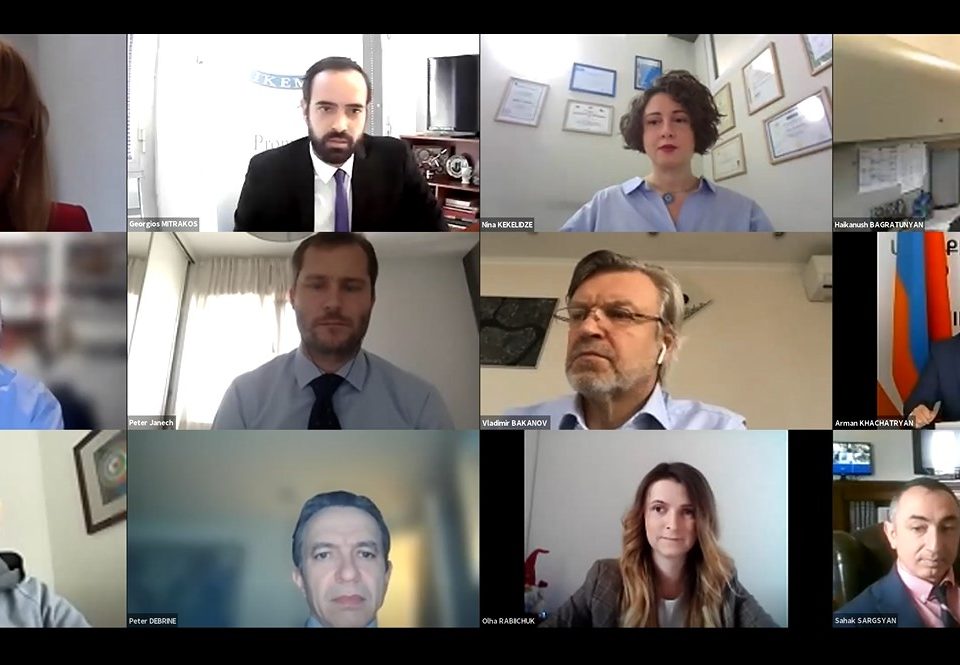
PRESS RELEASE
ICBSS – BBSC CPMR – HIT CERTH Webinar
"Transport in the Balkan and Black Sea region: Advancements in the port sector"
23 March 2021
The International Centre for Black Sea Studies (ICBSS), the Balkan and Black Sea Commission (BBSC) of the Conference of Peripheral Maritime Regions (CPMR), and the Hellenic Institute of Transport (HIT) of the Centre for Research and Technology Hellas (CERTH), co-organised a Webinar on "Transport in the Balkan and Black Sea region: Advancements in the port sector", on Tuesday 23 March 2021.
The main objective of the two-hour webinar was to update the discussion on port advancements in the Balkan and Black Sea region, addressing specifically the latest business developments and the ongoing efforts on environmental sustainability planning.
Under the moderation of Mr. Lefteris SDOUKOPOULOS, Associate Researcher at HIT/CERTH, a panel of prominent international experts exchanged views on supporting policies, business developments and environmental sustainability planning, that constituted the main pillars of the webinar’s discussion.
Opening remarks were delivered by Mr. Iain SHEPHERD, Senior Expert - Maritime Policy - Blue Growth, Data and Innovation, Maritime innovation, Marine Knowledge and Investment, Directorate-General for Maritime Affairs and Fisheries (DG MARE), European Commission. The Senior Expert analysed the policy context that covers the area, by referring to the Common Maritime Agenda’s goals and to the four Main Pillars of the Black Sea SRIA. Furthermore, Mr. SHEPHERD highlighted that transport is a priority and shipping is key to the Balkan and Black Sea region, and last but not least, that ports play a very important role in the connectivity of hinterland regions facilitating trade growth.
During the Session 1 on “Business Developments”, Dr. Sotirios THEOFANIS, President of EXANTAS Institute, Board Member of Thessaloniki Port Authority (Greece), Mr. George MAMULADZE, PhD candidate, Chief Officer, Invited Lecturer of Batumi State Maritime Academy (Georgia), Professor Ph.D. Kalin KALINOV, Deputy Chief of Nikola Vaptsarov Naval Academy, along with Associate Professor Antoaneta TRAYANOVA and Mr. Seyko SEYKOV Junior Expert in the Scientific Department at Nikola Vaptsarov Naval Academy, as well as Mr. Evgeni MOSKOV, Marine Cluster Bulgaria expert on Ports’ activities, expressed their views about the business developments in the port sector within the Balkan and Black Sea region, stressing the role of academic and research institutions into guiding and informing business decisions.
More specifically, Dr. THEOFANIS described the developments and challenges for the Ports in East Med and Black Sea, presenting considerations on new business models applied in the sector, key issues on port – hinterland connectivity (e.g. dry port development), green port policies, the emerging role of technology and digitalization and how these are affecting the sector, thus pointed out new needs, resources and the important role of training and regional cooperation.
In continuation, Mr. MAMULADZE talked about Georgian Ports, stressing the enhancing business activity. To this point, he outlined the new infrastructure that has started to be developed as well as the new port that will be constructed, while he also highlighted governmental actions aiming to simplify procedures and lower taxes better supporting in that way the attraction of investment interest in the country.
From their perspective, Prof. KALINOV and Mr. MOSKOV underlined the scientific approaches in support of port activities, by referring to the Marine Cluster Bulgaria and Nikola Vaptsarov Naval Academy. Their presentation gave emphasis on information support of coastal zone management, port and shipping modelling, simulation of processes related to port activities, ship manoeuvring and hydro-meteorological conditions, 3D modelling, disaster response, traffic and environmental assessment, assessment of hydro-meteorological factors, port security.
During the first Session, Mr. Stavros KALOGNOMOS, Executive Secretary of the Balkan and Black Sea Commission (BBSC), Conference of Peripheral Maritime Regions of Europe (CPMR), presented the Atlantic Smart Ports Blue Acceleration Network (AspBAN) project, that aims to launch blocks that will establish a dynamic acceleration services platform for EU Atlantic ports to work as blue economy hubs, thus, diversifying their business models and revenue sources.
The first panellist of the Session 2 on “Environmental sustainability planning”, was Mr. Valentin MOLDOVEANU, Tulcea County Councillor (Romania) and Acting President of the Balkan and Black Sea Commission (BBSC), Conference of Peripheral Maritime Regions of Europe (CPMR), who thoroughly presented the Port of Tulcea. Mr. MOLDOVEANU described the environmental and geographical perspective of the green port, the climate and biodiversity of the Danube Delta as well as the climate change impact, while he analysed the port’s green approach in the context of digitalization of port activities, integrated transport systems, sustainability and climate adaption. Moreover, he talked about the social innovations, in the prism of social enterprise ecosystems and responsible tourism.
Following, Associate Professor at the Batumi State Maritime Academy (Georgia), Mrs. Irine BARAMIDZE, outlined the ecological coalition of the Port of Batumi. Throughout her presentation, among others, she referred to some characteristics of the port, such as the sea water quality control elements, salinity of the surface layer during the 2017-2020 period, content of total suspended solid in surface layer, as well as to some summary results of nutrients value in the port’s surface layer.
The last speaker, Associate Professor Rosa Maria DARBRA ROMAN, Polytechnic University of Catalonia (Spain), gave a snapshot of European ports greening and sustainability efforts. Ms. DABRA ROMAN presented the recent ESPO / EcoPorts study that she was part of describing European-wide results on environmental management and monitoring indicators, the final top ten environmental priorities for 2020, and services provided by ports to ship operators (e.g. on-shore power supply system) for contributing towards a better environmental performance in the port area. As she stressed at the closure of her presentation, «despite Covid-19, European ports show a general trend of being proactive in terms of environmental involvement».
At Q&A and Open Discussion, speakers and participants had the opportunity to exchange multiple views about the above-mentioned issues. The webinar was open to public and welcomed the participation of a wide range of regional stakeholders, interested in or involved with port operations and trade development facilitation.
The highly attended webinar was the eighth of a series of webinars organised by the ICBSS in the context of the new era of online meetings on key issues targeting the wider Black Sea region, and the second of a series of follow-up webinars that build on the results of the Regional Stakeholders Conference “Black Sea Synergy: the way forward” (Athens, 8 November 2019). The first follow-up Webinar on “Transport in the Balkans and the Black Sea region” was held on 19 November 2020, addressing the sector as a whole.



